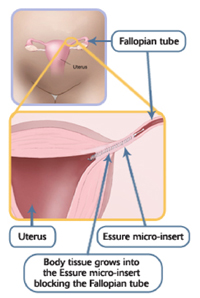
Essure has been in use for over five years and is covered by most insurance providers.
How it Works
The Essure procedure does not require any cutting into the body. Instead, Dr. Bartley inserts small flexible micro-inserts™ through the body’s natural pathways (vagina, cervix, and uterus) and into your fallopian tubes. Dr. Bartley is able to perform the procedure with anethesia and most women resume their normal activities within one day.
During the 3 months following the procedure, your body and the micro-inserts work together to form a natural barrier that prevents sperm from reaching the egg. During this period, you must continue using another form of birth control (other than an IUD or IUS).
Three months after the Essure procedure, Dr. Bartley will perform an Essure Confirmation Test, to confirm that the tubes are fully blocked and that you can rely on Essure for permanent birth control.
Unlike birth control pills, patches, rings, and some forms of IUDs, Essure does not contain hormones to interfere with your natural menstrual cycle. Your periods should more or less continue in their natural state.
Some of the Benefits of Essure Include:
Essure offers women what no birth control ever has
- No cutting
- No going under general anesthesia
- No slowing down to recover
- No hormones
- Short procedure time – Essure only takes about 15 minutes to perform
- Trusted by women and doctors for over five years
The Essure procedure is permanent and is NOT reversible. Therefore, you should be sure you do not want children in the future.
Protection Against STDs
The Essure device does not protect against sexually transmitted diseases (STDs). For those having sex, condoms must always be used along with the Essure device to protect against STDs. One of the concerns with the Essure device is that women who have multiple partners and do not use condoms can be at greater risk for STDs, and there’s the possibility that these diseases could develop into a pelvic infection. This is true, though, for all methods of birth control. Abstinence (not having sex) is the only method that always prevents pregnancy and STDs.
Important Links
